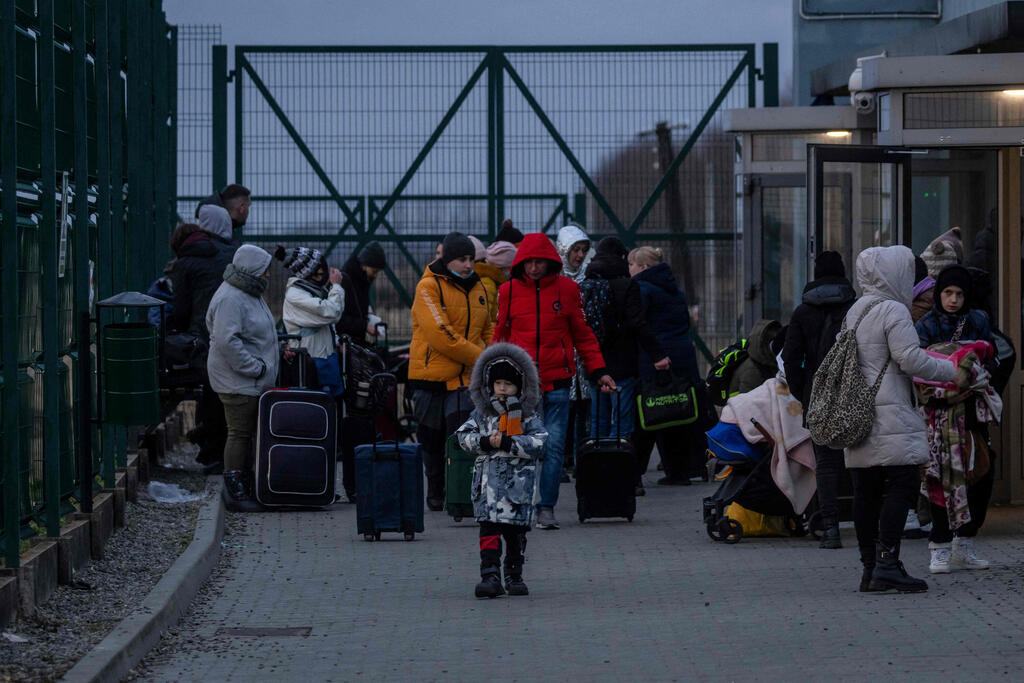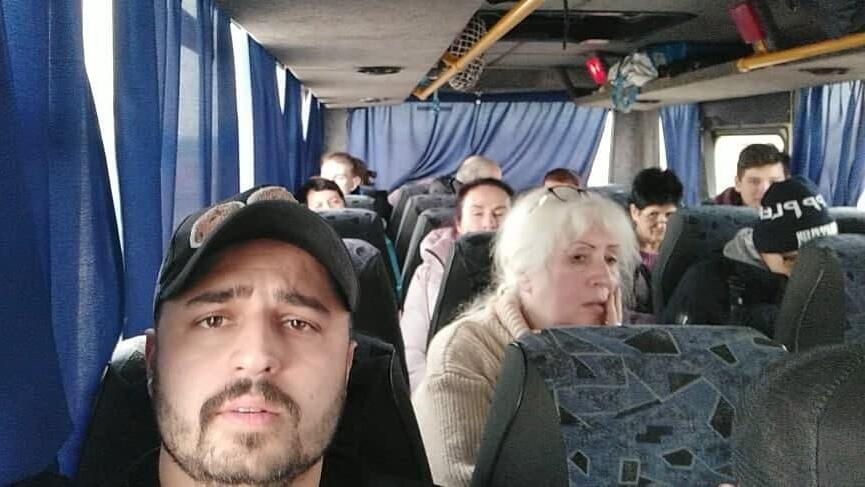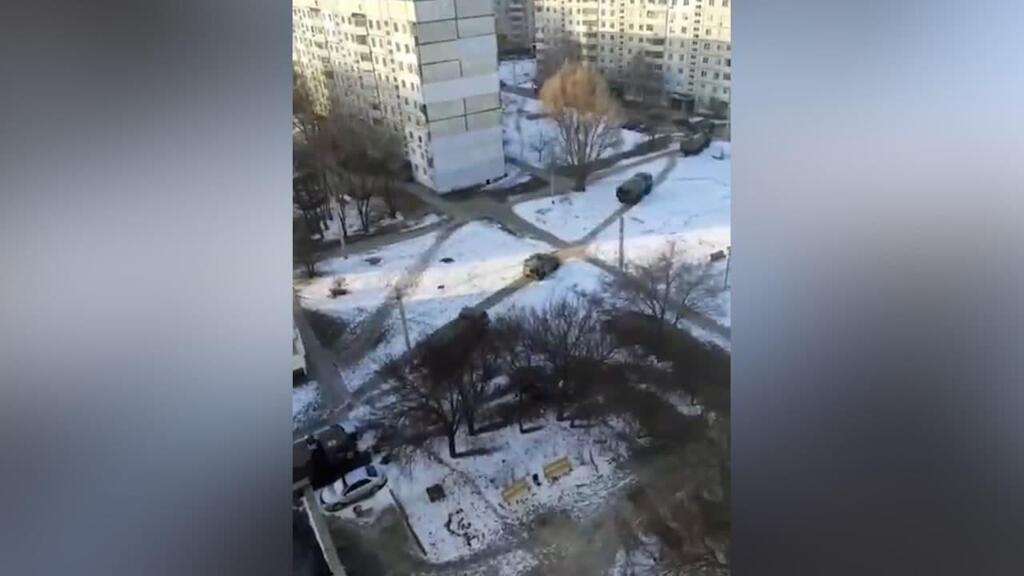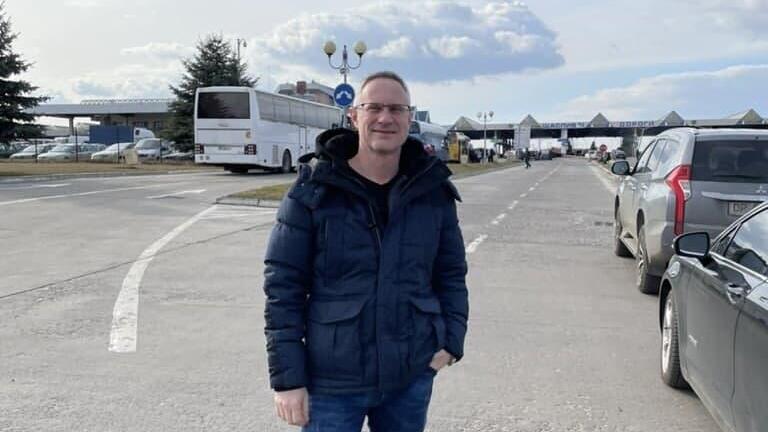As the Russia-Ukraine war rages on, hundreds of thousands of civilians are massing on the Ukrainian-Polish border in an attempt to flee and find a safe haven outside the war-torn country, and among them are thousands of Israeli nationals as well.
Alex Litovchik is one such Israeli national who managed to reach the Polish border and flee the country with his wife Marina and two daughters — 12-year-old Ella and 4-year-old Arielle — after an arduous 59-hour journey in the freezing cold, with almost no food, and under heavy emotional stress from the southern port city of Odesa.
5 View gallery
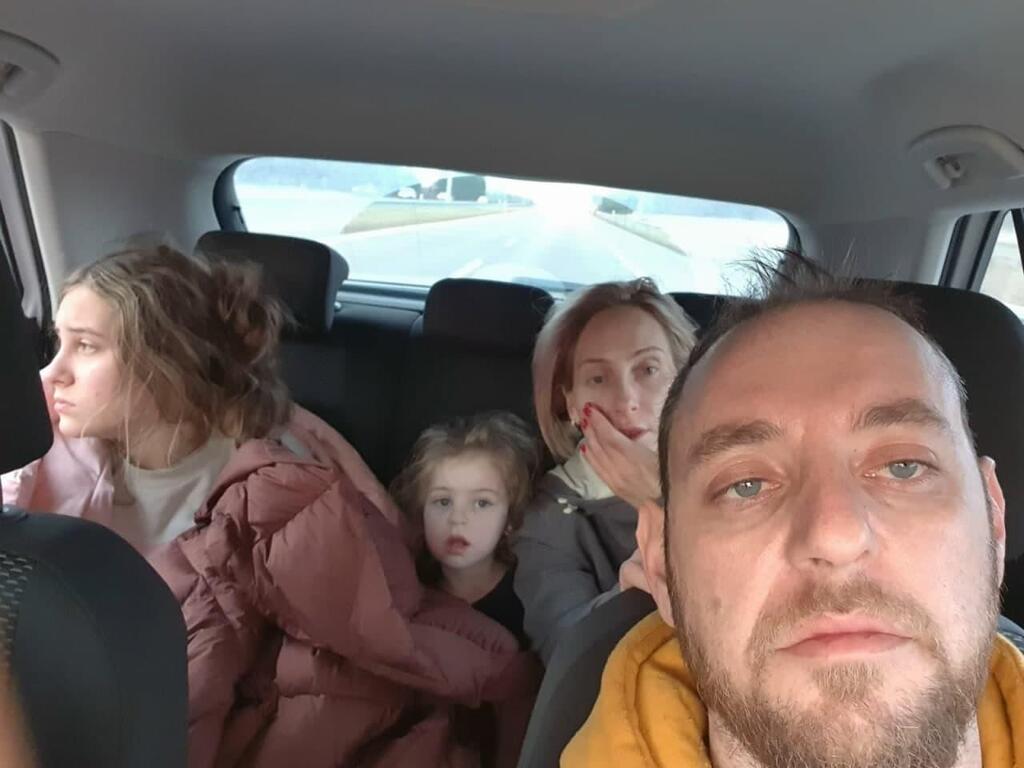

Alex Litovchik with his wife Marina, and two daughters, 12-year-old Ella and the 4-year-old Arielle en route to the Polish border
(Photo: Alex Litovchik)
"I went into a frenzy," Alex said. "I grabbed a suitcase and started pushing people aside until I reached the checkpoint. When I got there, I told them there was no chance they won't let me through, I'm an Israeli citizen, I got to get out of here."
"But the Ukrainian officer told me that 'only your wife and the girls can leave, you must stay. You are also a Ukrainian citizen, and men are not allowed to leave.' However, I didn't give up, I insisted on leaving until they let me through."
Litovchik, a chief information officer for a major Israeli high-tech company, traveled to Ukraine with his family to visit his wife's relatives ten days ago and got stuck there. They were supposed to take off from Odesa back to Israel last Thursday, but their plans quickly changed once Russia invaded.
He says that he first heard blasts across Odesa around 6am Thursday, and since all flights were canceled, they rented a car and drove for 30 hours to the Ukrainian-Polish border.
"The lines were interminable, it was freezing cold, about 5-℃ (23℉) and we weren't ready for such cold at all since Odesa is warmer. We took a cab to the border crossing because it was a 35-kilometer (22-mile) walk. We stood at the border crossing with thousands of people without food and almost no water while the long line of people wasn't moving at all," Litovchik said.
After long hours of waiting, Litovchik and his family managed to pass to the Polish side of the border, but only after a long back-and-forth with Ukrainian officers who insisted he stay behind and fight.
The Litovchiks spent several more hours in line on the Polish side before finally arriving at a hotel in Poland on Saturday evening.
"It was a terrible experience that we will never forget, we ran for our lives," he said.
Like the Litovchiks, Alex Ildatov also found himself stuck in Odesa. On Saturday morning, he got on a bus organized by a local Chabad center to rescue dozens of Israelis from the city on the way to the border with Romania.
"The situation is very scary, it feels like World War III is afoot. If it weren't for my relatives in Israel, I may have stayed in Odesa. Personally, this whole situation didn't scare me that much, and all in all, the situation in Odesa isn't that bad. The panic is quite unnecessary," Ildatov said.
Meanwhile, unlike the two Alexes, Haim and his wife found themselves grounded in the besieged capital Kyiv.
"We decided to leave at first, but then we arrived at friends that live in a village some 40 kilometers out of Kyiv, and we realized that the roads aren't safe, and there are huge lines stretching across the borders, so we decided to bunker down and wait," he said.
"We have been stuck here for three days now, and on Saturday, we woke up at around 5am to the blast sounds coming from Kyiv. We are ready to leave at any moment, we just wait for the right one, the whole situation is really terrifying.
We don't want to rush and leave this place, because it is quite safe and calm here, we have also been warned about the long lines at the borders, and that people had to wait a few days while stuck in the freezing cold weather. We also know of people who got stuck in the middle of the road because they ran out of gas."
Haim said the Ukrainians seem willing to fight for their lives.
"There are people here that we know who went to fight in Kiyv on Saturday and on Sunday we were warned that we shouldn't leave because there were some serious skirmishes with the Russians ongoing on the roads. They disguise themselves as police and firefighters in an attempt to stop people who try to flee the country."
Anastasia Borisenko and her family are Israeli nationals stranded in the eastern city of Kharkiv, where Russian forces have made significant inroads.
"It was a restless night, we heard explosions, and they happen quite often. I've been in this house for four days straight. We found a group on Telegram in which someone is organizing a bus, taking names of Israelis who stayed behind, so my sister and I are waiting," she told Ynet Sunday.
Borisenko, who was bunkering down in the city center, said she did not see any fighting since most were taking place in the city's northern suburbs. However, she noted that some of her relatives were living in the heavily bombarded area and hiding in bomb shelters.
Israeli Ambassador to Ukraine Michael Brodsky told Ynet from Poland that Israeli teams were stationed on both sides of the border and were actively trying to contact Israelis who were left behind.
"Our people are working around the clock, and we receive calls from Israelis either stuck in lines at the border or in the cities across Ukraine," he said.
"Over the last three days, some 1,500-2,000 Israelis left Ukraine, but there are still a few thousand left in the country. Some of them can't leave, and others decided to stay put due to the harsh situation across the borders. There are also some Israelis who prefer to stay in the west or south of Ukraine because they are considered safer and wait until things simmer down so they could return or leave the country, instead of standing still for hours in the long lines."


